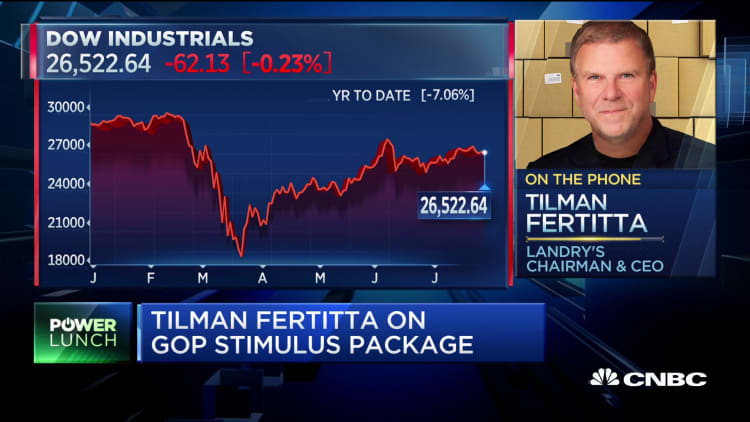Senate Republicans want unemployment benefits to replace 70% of lost wages.
But that wouldn't apply across the board.
For many high earners and middle-class workers, particularly those living in the South and Southwest, unemployment benefits would replace a smaller share of prior pay.
That's due to a cap Republicans placed on federal aid.
More from Personal Finance:
Why unemployment is a broken system
In HEALS Act, student loan borrowers don't get much
How second stimulus checks may differ from the first
Exactly who would get less than 70% of lost wages largely depends on the generosity of their state's unemployment program.
And it varies broadly.
In some states, an unemployed worker who had made more than $55,000 a year would have a wage replacement of less than 70%, according to a CNBC analysis of the Republican proposal. In other states, the bar is closer to $100,000.
"I was surprised at how low that income threshold was in some states," said Ernie Tedeschi, an economist at Evercore ISI.
"[At] $55,000, you are not rich," said Tedeschi, a former Treasury Department official, adding that "that's pretty solidly middle class" in states with that threshold.
HEALS Act
Unemployed workers have been getting an extra $600 a week from the federal government since late March to supplement state jobless aid.
That enhancement, created by the CARES Act, ends July 31.
A coronavirus relief plan unveiled Monday by Senate Republicans — the so-called HEALS Act — would cut that subsidy to $200 a week until October.
Then, states would shift to a system whereby combined state and federal benefits would replace 70% of a worker's prior pay. (For comparison, state aid replaced an average 38% of lost wages in the first quarter of 2020, according to the Labor Department.)
But Republicans would cap the federal supplement at $500 a week. Since states also cap their weekly pay, there would be an upper limit on the amount of aid a worker could get.
The ceiling kicks in fastest for unemployed workers in Mississippi, Arizona, Louisiana, Alabama, Florida and Tennessee.
There, anyone with a salary exceeding $54,600 (Mississippi) to $57,571 (Florida and Tennessee) would make less than 70% of prior pay from unemployment benefits, according to a CNBC analysis.

This is due largely to the less-generous nature of these states' unemployment systems. Mississippi, Arizona, Louisiana, Alabama, Florida and Tennessee cap their aid at between $200 and $300 a week.
By comparison, other states like New Jersey, Connecticut, Rhode Island, Minnesota and Washington cap their weekly unemployment benefits at between $700 and $800.
It therefore takes a much larger salary in these states to hit the income threshold. Only when one's salary exceeds $90,000 to $96,000 does their wage-replacement rate start to fall below 70%.
In Massachusetts, which has the highest weekly benefit cap (above $1,200), the salary threshold is nearly $129,000.
Lower earners
Of course, this doesn't necessarily mean lower earners do well under the Republican plan.
The current $600-a-week policy has disproportionately helped lower earners over higher ones.
For one, lower earners have been more likely than higher earners to lose a job during the pandemic.
The $600 weekly supplement also offered a substantial income boost for these workers.
Consider the average bartender, who makes about $13.50 an hour, according to the Bureau of Labor Statistics.
This person would make just $378 a week from unemployment under Senate Republicans' 70% plan. However, if this worker were collecting the average state unemployment benefit ($321 a week in May), they would take home about $921 a week via current policy — more than twice the amount of the Republican plan.
Pipe dream?
Of course, this all assumes the 70% plan becomes law — which isn't a given, since Democrats don't support the policy.
It also assumes states can implement such a formula, which experts say is more complicated than a flat weekly payment (since it's individualized for each worker) and would take months to implement.
"It's a heavy lift for the states to do anything like this," said Andrew Stettner, a senior fellow at the Century Foundation.


